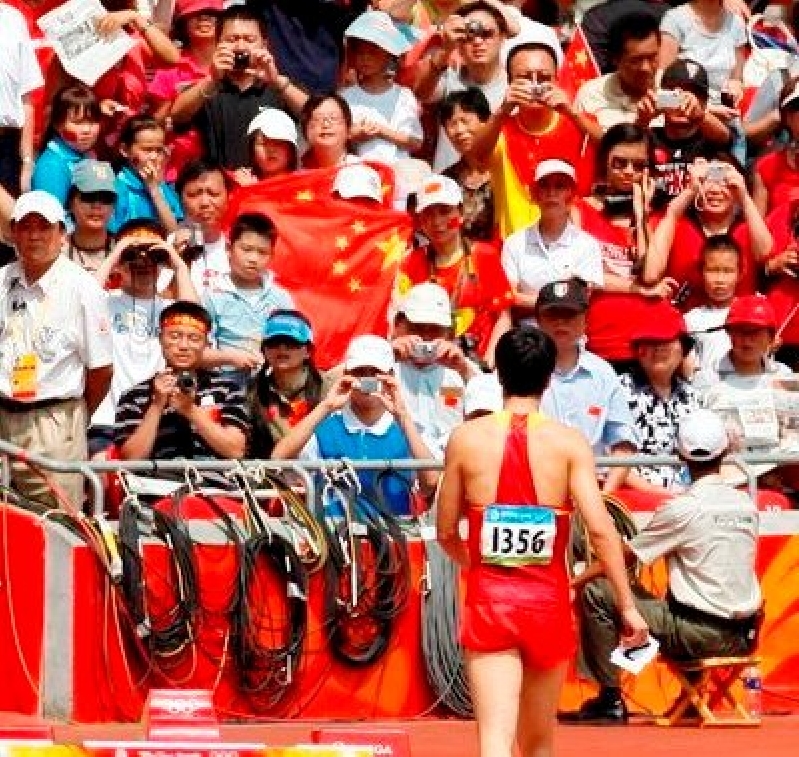
On the morning of Aug. 18th, China’s defending Olympic gold-medalist in the 110-meter hurdles, Liu Xiang, withdraw from the race in the first round of the 110-meter hurdles because of injuries in his Achilles tendon. Liu’s fans, old and young, were filled with disbelief, disappointments, shock, and regret to see their hero in defeat.
After this news spread out, numerous debates about whether Liu should have forfeited and whether or not he lived up to the Olympic spirit began to spring up. Some say that Liu has let down the billion people of China, while the overwhelming majority of the commentaries were messages urging for tolerance and affirmation.
An online poll posted after Liu pulled out attracted more than 45,000 respondents within three hours; nearly three-quarters of them said they still "considered Liu Xiang the 'Flying Man', according to The Times.
The headlines of mainstream medias and China’s media were “Liu Xiang, the everlasting hero inside the Chinese people’s hearts”, “Those who care for Liu Xiang are those who tolerate him”, “Let us sent sincere comforts to Xiang Liu”, and “Gold medal is tiny in front of humanity”, which were messaging calling for tolerance for Liu’s forfeit and for giving comfort to him.
While the media were making their way to defuse the disappointments, numerous believers in mainland wrote on their blogs and websites their concerns for Liu who had to go through this painful experience. Prayers were offered for Liu and his family, and some the emphasis that every man deserves respect not because of what he has accomplished, but just because we are created in the image of God.
Since the Sichuan earthquake, where tens of thousands of people were killed, Chinese media has aired logo “Unite as One” and reporters even wept on the air. Now, that collective empathy can be seen once again in response to Liu’s withdrawal, as Yin Hong, a professor of communications at Beijing’s Tsinghua University, told The Times.
“Since the earthquake, the media have seemed to discover the value of individual and the value of life, in communication with the public,” Yin said. “The public also developed a shared consciousness and a sympathetic response. That is different from a simple sense of nationalism.”
Some Christians still respect him and upheld his hero status, because Liu was brave enough to admit his weakness. Some said his forfeit has caused many to realize that they have tried to deify an individual athlete and they started to search for the truth and God.
Ever since Liu broke the world record for the 110 meter hurdle race at the 2004 Olympics in Athens, people in China has placed him as the center of attention. Prior to his winning of the medal, there was not even one Chinese contender to win a medal in the history of track and field. Later, Liu was voted as one of top ten people who inspired China.
When he was presented with the award, the quote that was used to describe Liu’s feat was that in 12:19 seconds, he accomplished a great leap; China’s record in the last 100 years has become a past history; ten consecutive hurdles is no longer an obstacle for the Chinese, because China has Liu Xiang, Asia has Liu Xiang.
After winning the gold medal in the 2004 Athens Olympics, Liu kept pressing forward. At the 2006 Lausanne competition, Liu once again set the world record at 12:88 seconds. Soon after, he won again at the Tokyo Championship. Liu had been the world’s undisputed champion of the 110-meter hurdles.
In the Sept. issue of 2006, Angel’s Heart Hong Kong, a Christian magazine, wrote a special coverage focusing on the struggling experiences of Liu until breaking the world record in 110-meter hurdles.
When Liu was young, his grandmother often read stories from the Bible to him, teaching him the morality as a human being. His grandmother is very kind, always treated others with a generous heart, which brought much positive influence towards him.






